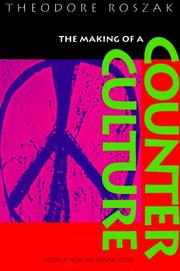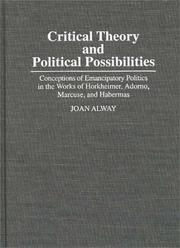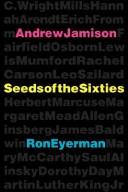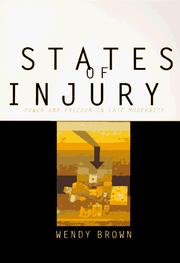| Listing 1 - 4 of 4 |
Sort by
|

ISBN: 0520201221 Year: 1995 Publisher: Berkeley University of California Press
Abstract | Keywords | Export | Availability | Bookmark
 Loading...
Loading...Choose an application
- Reference Manager
- EndNote
- RefWorks (Direct export to RefWorks)

ISBN: 0313293171 Year: 1995 Publisher: Westport (Conn.): Greenwood
Abstract | Keywords | Export | Availability | Bookmark
 Loading...
Loading...Choose an application
- Reference Manager
- EndNote
- RefWorks (Direct export to RefWorks)
141.822 --- Critical theory --- Frankfurt school of sociology --- #GROL:SEMI-32-05.545 1 --- Critical theory (Sociology) --- Frankfurt school --- Frankfurt sociologists --- Schools of sociology --- Marxian school of sociology --- Critical social theory --- Critical theory (Philosophy) --- Negative philosophy --- Criticism (Philosophy) --- Philosophy, Modern --- Rationalism --- Sociology --- Socialism --- Ontwikkeling van het marxisme. Frankfurter Schule --- Adorno, Theodor W. --- Habermas, Jurgen --- Horkheimer, Max --- Marcuse, Herbert --- Habŏmasŭ, Wirŭgen --- Habŏmasŭ --- Khabermas, I︠U︡. --- Khabermas, I︠U︡rgen --- Ha-pei-ma-ssu, Yu-erh-ken --- Habeimasi --- הברמאס, יורגן --- יורגן הברמס --- 哈贝马斯 --- Critical theory. --- Frankfurt school of sociology. --- 141.822 Ontwikkeling van het marxisme. Frankfurter Schule --- Habermas, Jürgen --- Adorno, Theodor W., --- Habermas, Jürgen. --- Horkheimer, Max, --- Marcuse, Herbert, --- Markouze, Chermpert, --- Markuze, Herbert, --- Ma-erh-kʻu-sai, --- Mārkiyūz, Hirbirt, --- מרקוזה, הרברט --- ماركيوز، هربرت، --- Horḳhaimer, M. --- הורקהיימר, מקס --- 霍克海默尔, --- Хоркхаймер, Макс, --- Khorkkhaĭmer, Maks, --- Wiesengrund, Theodor, --- Wiesengrund-Adorno, Theodor, --- Adorno, Teodor V., --- Adorŭno, --- אדורנו, תאודור --- אדורנו, ת. ו. --- Adorno, Th. W. --- Habermas, Jürgen. --- Habermas, Jürgen

ISBN: 0585249725 0520917162 9780520917163 9780585249728 0520085167 0520203410 Year: 1995 Publisher: Berkeley, Calif. University of California Press
Abstract | Keywords | Export | Availability | Bookmark
 Loading...
Loading...Choose an application
- Reference Manager
- EndNote
- RefWorks (Direct export to RefWorks)
"The Sixties." The powerful images conveyed by those two words have become an enduring part of American cultural and political history. But where did Sixties radicalism come from? Who planted the intellectual seeds that brought it into being? These questions are answered with striking clarity in Andrew Jamison and Ron Eyerman's book. The result is a combination of history and biography that vividly portrays an entire culture in transition. The authors focus on specific individuals, each of whom in his or her distinctive way carried the ideas of the 1930s into the decades after World War II, and each of whom shared in inventing a new kind of intellectual partisanship. They begin with C. Wright Mills, Hannah Arendt, and Erich Fromm and show how their work linked the "old left" of the Thirties to the "new left" of the Sixties. Lewis Mumford, Rachel Carson, and Fairfield Osborn laid the groundwork for environmental activism; Herbert Marcuse, Margaret Mead, and Leo Szilard articulated opposition to the postwar "scientific-technological state." Alternatives to mass culture were proposed by Allen Ginsberg, James Baldwin, and Mary McCarthy; and Saul Alinsky, Dorothy Day, and Martin Luther King, Jr., made politics personal. This is an unusual book, written with an intimacy that brings to life both intellect and emotion. The portraits featured here clearly demonstrate that the transforming radicalism of the Sixties grew from the legacy of an earlier generation of thinkers. With a deep awareness of the historical trends in American culture, the authors show us the continuing relevance these partisan intellectuals have for our own age. "In a time colored by 'political correctness' and the ascendancy of market liberalism, it is well to remember the partisan intellectuals of the 1950s. They took sides and dissented without becoming dogmatic. May we be able to say the same about ourselves."--from Chapter 7.
NON-CLASSIFIABLE. --- United States --- Intellectual life --- Civilization --- 20th century america political history. --- 20th century american culture. --- 20th century american history. --- allen ginsberg. --- american culture. --- american history. --- c wright mills. --- dorothy day. --- environmental activism. --- erich fromm. --- fairfield osborn. --- hannah arendt. --- herbert marcuse. --- intellectual partisanship. --- james baldwin. --- leo szilard. --- lewis mumford. --- margaret mead. --- martin luther king jr. --- mary mccarthy. --- mass culture. --- old left. --- politics. --- rachel carson. --- radicalism. --- saul alinsky. --- scientific technological state.

ISBN: 069102989X 9780691029894 0691029903 0691201390 Year: 1995 Publisher: Princeton, New Jersey : Baltimore, Md. : Princeton University Press, Project MUSE,
Abstract | Keywords | Export | Availability | Bookmark
 Loading...
Loading...Choose an application
- Reference Manager
- EndNote
- RefWorks (Direct export to RefWorks)
Whether in characterizing Catharine MacKinnon's theory of gender as itself pornographic or in identifying liberalism as unable to make good on its promises, Wendy Brown pursues a central question: how does a sense of woundedness become the basis for a sense of identity? Brown argues that efforts to outlaw hate speech and pornography powerfully legitimize the state: such apparently well-intentioned attempts harm victims further by portraying them as so helpless as to be in continuing need of governmental protection. "Whether one is dealing with the state, the Mafia, parents, pimps, police, or husbands," writes Brown, "the heavy price of institutionalized protection is always a measure of dependence and agreement to abide by the protector's rules." True democracy, she insists, requires sharing power, not regulation by it; freedom, not protection. Refusing any facile identification with one political position or another, Brown applies her argument to a panoply of topics, from the basis of litigiousness in political life to the appearance on the academic Left of themes of revenge and a thwarted will to power. These and other provocations in contemporary political thought and political life provide an occasion for rethinking the value of several of the last two centuries' most compelling theoretical critiques of modern political life, including the positions of Nietzsche, Marx, Weber, and Foucault.
Political science --- Power (Social sciences) --- Culture --- Feminist theory --- Liberty --- Philosophy --- Culture. --- Feminist theory. --- Liberty. --- Philosophy. --- Power (Social sciences). --- Empowerment (Social sciences) --- Political power --- Exchange theory (Sociology) --- Social sciences --- Sociology --- Consensus (Social sciences) --- Political philosophy --- Civil liberty --- Emancipation --- Freedom --- Liberation --- Personal liberty --- Democracy --- Natural law --- Equality --- Libertarianism --- Social control --- Feminism --- Feminist philosophy --- Feminist sociology --- Theory of feminism --- Cultural sociology --- Sociology of culture --- Civilization --- Popular culture --- Social aspects --- Political science - Philosophy --- Arendt, Hannah. --- Baudrillard, Jean. --- Connolly, William. --- Ehrenreich, Barbara. --- Freud, Sigmund. --- Gilligan, Carol. --- Habermas, Jurgen. --- Haraway, Donna. --- Irigaray, Luce. --- Jameson, Fredric. --- Keynesianism. --- Leviathan (Hobbes). --- Locke, John. --- Marcuse, Herbert. --- Mill, John Stuart. --- Piven, Frances Fox. --- Plato. --- Rorty, Richard. --- Sandel, Michael. --- Weber, Max. --- Williams, Patricia. --- abortion rights. --- de Beauvoir, Simone. --- sexual division of labor.
| Listing 1 - 4 of 4 |
Sort by
|

 Search
Search Feedback
Feedback About UniCat
About UniCat  Help
Help News
News